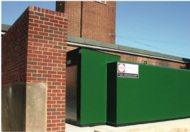County Council converts to biofuels for school boilers

Chase School in Worcestershire is spearheading the move towards biofuels for boilers, with the help of Nu-way.
The modification of boilers in schools in Worcestershire to use biofuels will reduce carbon emissions. Nu-way is working with Worcestershire County Council to convert burners. The first project is at Chase School in Malvern, where a burner has been modified to operate using a range of biodiesel and bio-oils and refitted to the existing 450 kW boiler. A series of long-term laboratory tests and field trials involves the use of varied biodiesels, including blends such as B20 (20% rape-seed oil and 80% diesel), 100% RME (rapeseed-oil methyl ester) or modified rape-seed oil, plus pure rape-seed oil. The performance of burner and boiler will be closely modified to determine effectiveness and potential long-term issues arising from the technology. In addition, modifications have been carried out to reduce deposits on the burner-head assembly and combustion chamber. Fuel-line components are also being upgraded to resist increased degradation produced by biodiesel. James Sopwith, managing director of Nu-way, says, ‘This is an extremely exciting project for both Nu-way and WCC, and we are confident the results will show what con be achieved in terms of carbon-emissions reduction with a small amount of equipment modification and, in turn, low capital-cost outlay. ‘Biofuel can be up to 100% vegetable oil and therefore a completely renewable source of energy. our initial trials at The Chase School, utilising an 80:20 blend, delivers a significant reduction in the production of greenhouse gases.’
Related links:


